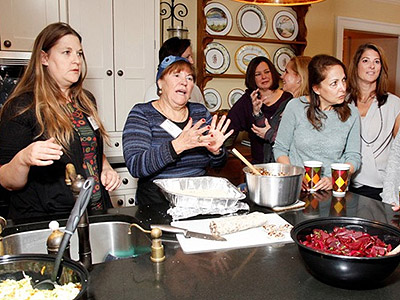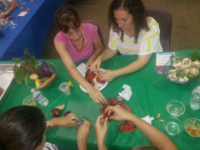Bringing The Spice Of Netivot To Philly

“Spice Girl” Suzan Miara of Netivot (center) gives a cooking demonstration to a group of women at a home on the Main Line. Photo by Scott Weiner
By Deborah Hirsch, The Jewish Exponent
January 21, 2013
Seven Israeli women bustle in and out of a small prep kitchen on the top floor of the Jewish Community Services Building, bantering in Hebrew as they unwrap trays of stuffed chicken thighs, potatoes, squash and fresh rolls.
“Melach? Afo hamelach?” (“Salt? Where’s the salt?”)
“Here, here, I have three bowls,” another women calls, distributing them to waiting hands.
“Here’s the salt,” another chimes in, triumphantly extracting the round canister from a mail bin filled with ingredients and pouring a generous mound into a cabbage salad. A fellow cook swoops in to mix it with her bare hands, scooping a taste into her mouth before moving on to her next task.
This was the last formal meal that these seven women would prepare during a weeklong “culinary tour de force” in Philadelphia to show off the cooking venture that brought them together as friends, catering partners and, most recently, contributors to a cross-cultural cookbook.
The “Tavlinim” group, Hebrew for “spices,” dates back about five years, created by Netivot’s Social Services Department as a way to empower women on welfare to earn extra income. The program is supported by Philadelphia’s Partnership2Gether connection with sister cities Netivot and Sedot Negev.
Since the Philadelphia partnership was established 14 years ago, the Jewish Federation of Greater Philadelphia has funneled about $10 million to the two southern mostly disadvantaged Israeli communities, including $480,000 during the most recent funding cycle, according to Jeri Zimmerman, who directs the agency’s Center for Israel and Overseas.
Those funds have gone into everything from computer software for educational programs to an agricultural research lab. About $65,000 has been distributed to the cooking program since it started, helping pay for the women to go through business courses, purchase dishes and other catering supplies, publish their cookbook and travel here for their recent tour.
At first, the “Spice Girls,” as they have become affectionately known by their American supporters, mostly cooked meals at their homes for visiting tour groups. As they became more organized, local businesses and community organizations also began hiring them for various catering gigs. The cooperative now includes 25 women ranging in age from their 30s to 60s, many originally from places like Morocco, Tunisia and Ethiopia.
“If the woman wants to cook or bake, she can belong,” explained 64-year-old Susan Miara, who was among the founding members after she retired from her job leading activities in a senior day center. “The whole point was to get out of our homes and to earn some money.”
Many of them still work other jobs because they don’t get enough catering requests to support their families. But even when they don’t have a paid job, they meet up once a week to socialize and everybody brings something homemade to share, Miara said.
For Simona Yifrach, a bookkeeper with six kids and 14 grandkids, the group became a support system when she lost her husband. “Beyond being a nice social gathering, we learn from each other and each other’s recipes and, of course, it helps financially,” Yifrach said.
None of them set out to become professional cooks — it was just something they learned from their mothers growing up.
“I always cooked,” Miara said. “When you have a big family, you have to know how to cook.”
Culinary training or not, the women’s expertise with food caught Tracy Ginsburg’s attention when she was in Netivot a couple of years ago for a Partnership2Gether committee visit. They served them a meal “fit for a king” — “cous cous and lamb and eggplants and all kinds of salads,” recalled Ginsburg, 51, of Glaydwyne.
“You thought you were done but you weren’t done because the food kept coming.”
Later, when committee members were brainstorming ways to come up with more collaborative programs — a challenging task “when we’re the givers and they’re the receivers,” Ginsburg said — she wondered whether a cookbook might bridge the divide. The Netivot women’s style was so completely different from the meat-and-potato, Eastern European-influenced food that American Jews often serve.
Why not bring those two worlds together in a multigenerational cookbook?
With the help of fellow committee member Bunny Levyn, she solicited recipes from area Jewish women who were passionate about cooking, and Partnership2Gether staff did the same with women in Netivot.
That was actually more difficult than it seemed because many of them learned to cook by just doing it with their mothers. They weren’t used to writing down directions or specifying quantities, said Talia Leibler-Gabay, a Jewish Agency for Israel employee who works for the Partnership in Israel. They would say things like, “ ‘You’ll see, you’ll know when it’s done,’ ” Leibler-Gabay said.
Miara nodded. “It’s all in my head,” she confessed. “But if they tell me to, I write it down.”
Once all the recipes were gathered, the Spice Women cooked everything — including the American contributions — so that all the dishes could be photographed for the book.
Federation allocated $20,000 for a company in Israel to put everything together. The final product is divided into sections based on the Jewish holidays with each recipe printed in both English and Hebrew.
The Jewish Kitchen Diaries: A Journey Through Time and Culture was printed in fall 2012, just in time to be given as a gift to each of the 200-some participants in Federation’s Mega Mission last December. So far, about 2,400 copies have been distributed. The proceeds will go back to the Partnership2Gether budget, Zimmerman said.
Once the book was out, bringing some of the Netivot cooks to lead demonstrations in Philadelphia seemed like a natural next step to show the community here what the partnership actually does, Ginsburg said.
But this was not a sightseeing tour. The women worked every day, leading workshops and cooking demonstrations at private homes, synagogues and community events.
One highlight was an Oct. 28 dinner for Federation’s Renaissance Group that attracted more than 40 women, including five who had first learned about the Spice group while dining at one of their homes during the “Israel 360” mission for young professionals in May.
“The food was amazing and we thought, ‘we could do this,’ “ said Sarah Stroback, a Center City resident who works in on-demand television programming.
About a month after returning home, she and her four new friends gathered at her apartment to try their hand at stuffed cabbage, gazpacho and a pea spread from the Partnership cookbook.
It was just a fun, “easy way for us to remember our experience in Israel and spend time together,” said Stroback. Though the cooking date was only one of their many get-togethers since the trip, Stroback said she feels like they’ve created the same kind of camaraderie that the Netivot women conveyed.
In addition to cooking, the "Spice Girls" got a chance to spend Shabbat with host families and a few breaks to tour Philadelphia and shop. Two of them ended up buying matching hot pink sneakers because their legs hurt from being on their feet so much.
“I was afraid of how I would get along in a strange country but they accepted us in such a wonderful way — with joy,” said Aliza Abekassis, 62.
Abekassis became the cook of her family when her mother died of a heart attack. She was 14 then. Her father had died around the same time in the Six-Day War, leaving the six children in the care of their grandmother. Cooking was a necessity, Abekassis said, not something she ever expected to get paid to do.
The whole Philadelphia experience “gave us the motivation to continue and make us feel that we could make a restaurant on our own,” said Rachel Azoulay, 53.
That’s actually not just a pipe dream. The Netivot municipality donated a building to the group, but it needs major renovations to be equipped with an industrial kitchen. Meanwhile, a second cooking group launches this month with 25 women who will specialize in baking.
Being able to take what they’ve started and turn it into “a real business” would be amazing, Miara said.
“We need to protect this family,” she said, referring to both her fellow cooks and their relationship with Philadelphia supporters. Earning money is important, she said, but this cooking project, “it’s for my soul.”
Click here to be redirected to the original article.





